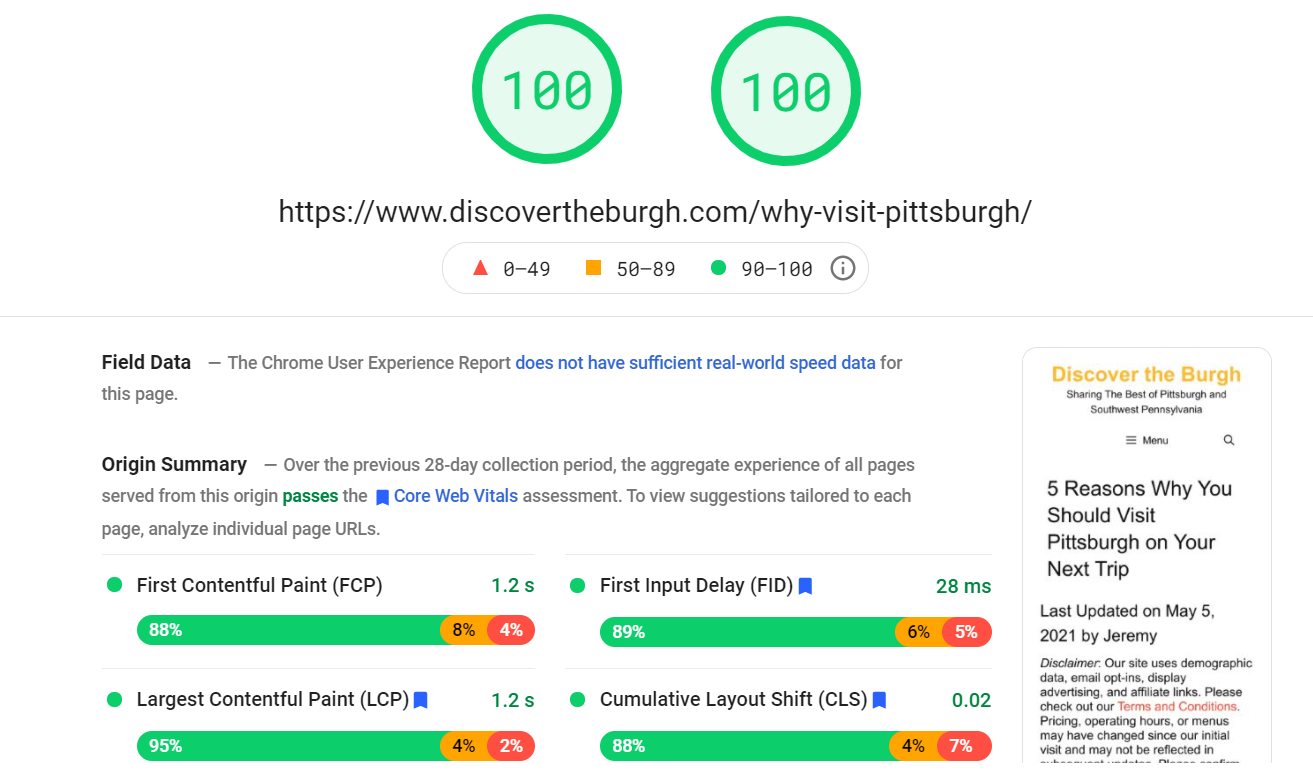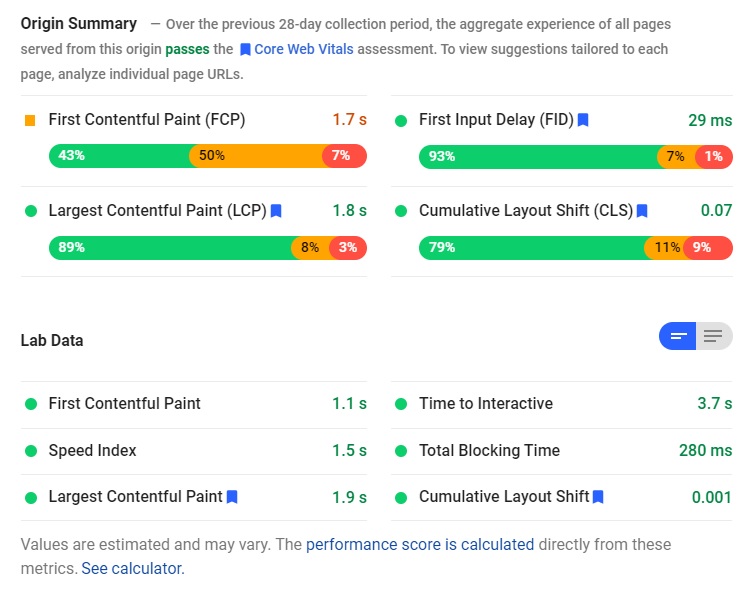Published by Jeremy. Last Updated on August 20, 2023.
Disclaimer: This Week in Blogging uses demographic data, email opt-ins, and affiliate links to operate this site. Please review our Terms and Conditions and Privacy Policy.
It is hard to believe that I have been blogging for over 15 years now, and since starting in 2008, it feels like I've made just about every blogging test imaginable to determine what does and does not work on my sites (be it for traffic, affiliate sales, social media reach, and more).
One common trend I've seen repeatedly is that I make a test, find that the results “didn't work,” write the idea off, and move on to something else. Then, months or years later, I returned to the idea one more time only to find that it worked better than I ever dreamed.
As it turns out, the idea itself wasn't bad, but instead that it I was not analyzing the results correctly or, in most cases, simply doing the test too early in my blogging journey!
So in this one, I thought I'd share a bit more about some lessons I've learned and why you may want to repeat past experiments as your site grows and evolves.
Are You Targeting the Right Readers?
One of the biggest mistakes I made in my early years of blogging was writing content without keeping the target audience in mind. I'd do no keyword research. I had no target audience on social media. I just wrote, published, and hoped that if I wrote it, an audience would come.
To no one's surprise, this was a failure, and my traffic remained stagnant for quite some time.
It wasn't until I became more strategic in SEO and keyword research that I learned how to target search traffic and, more importantly, rank for specific terms appropriate for my site's size and authority. This involved changing my writing style, being strategic in picking topics that fit my site, and getting into the finer details of all things SEO.
With growth came an audience, and with the audience came the ability to circle back to write content that may not necessarily rank but would still be read by existing subscribers.
This highlights a common problem in blogging because your writing style may not target the right reader at the right time.
New bloggers may want to work on writing content that could rank in search engines (or your site can grow into), do well with a marketing budget on social media, and other techniques designed to target readers you're not connected to. Established bloggers with tens of thousands of subscribers get to circle back to the creativity we all enjoyed when we first started because you already have a captive and interested audience.
The concept of writing for the “right reader” also extends to affiliate marketing for similar reasons. You may have a great idea for a post, throw in many affiliate links, and not see a single sale after several months or years.
This may not necessarily be the fault of the product or service you are promoting but rather because the article you wrote is targeting the wrong kind of reader based on where they may fall within the sales funnel. In impulse shopping fields, like fashion, this may be less noticeable, but in industries with long lead times (e.g. travel), readers may read a planning post months or years before they actually take a trip.
Are they going to click that affiliate link and purchase within a cookie period in a post they're only using to get ideas? Probably not. But what if you wrote the article in the mindset of someone looking to buy right now? Well, now you may be getting somewhere.
Much like the previous example, this is another case of bloggers not strategically targeting the right reader for the content. Changing your mindset in figuring out who you're writing for and how you're going to reach them is just as, if not more, important than what you're writing about!
So if you have ever experienced what feels like a failure for an article you've written in the past that did not do as well as you like, take a minute to stop and think, “what can I do differently to reach the right person for this article?”. You may find that your “bad idea” wasn't so bad after all.
Is Your Site Receiving Appreciable Traffic?
For most of my tests, one of the biggest problems I faced when my sites were young was that I did not have appreciable traffic outright. I'd put a new affiliate link or article style out there, find that they didn't convert to my liking after a given time, claim the company/article type/product was not a match for my site and readers, and discount it entirely.
Cut to a few years later, my sites grew, I tried the same test again, and like magic, it worked!
Why was this the case?
Ultimately, understanding site performance is a bit of a numbers game- particularly around affiliate marketing (although this concept can apply to many tests you may try with your site from a slightly different angle).
Affiliate marketing is perhaps the easiest to address since the numbers are a bit easier to illustrate. Most of my products convert 1-10% of clicks. This means that for every 100 outbound clicks, I will make 1-10 sales. But in even the best cases, I may only get outbound clicks on 1-10% of page views (1-3% being more common, of course).
Working out the math, we come to the fact that highly targeted articles may need 100 page views to influence sales, and those with more generic affiliate prompts with lower rates may need upwards of 10,000 page views to make a single sale!
Therein lies the problem. If your site or pages are not receiving much traffic, which is the case for newer or less established sites, you may find that sales are few and far between. The test may look like a failure to you, the promotion possibly being “not a fit” for your readers, you discount them, and move on.
But the truth is that if you are making a 1-10% conversion rate on clicks, you're probably doing alright- you just need more clicks! Circling back, this could mean changing your copy outright to try and encourage more clicks, or, in other cases, that your pages need more traffic outright.
Cut to a few years later, your site is now 10x larger (or said articles are higher in traffic on their own), and all of a sudden the same 1-3% conversion rate on 10x more clicks is bringing in sale after sale for the very same product in a repeat test.
It wasn't a bad test, you just didn't have an appreciable amount of the “right” kind of traffic.
So as you grow, be sure to think back on tests you may have made that you thought would work but didn't- you just be surprised by what you find if you test them again.
Are You Monitoring Data?
Finally, one of the biggest problems regarding perceived failures in blogging tests is not checking data outright.
As alluded to above, one of the biggest problems bloggers have in achieving success is that you don't know what you don't know. This is especially true when you are writing, publishing content out into the ether, crossing your fingers, and hoping for the best.
Do you rank for your target keyword? Do you rank for keywords you inadvertently stumbled upon? How difficult are those keywords to rank for? Is your site large enough to be competitive? What kind of social reach are you getting on a share? What about all of that click data for affiliate links? I could go on.
One of the biggest reasons blogging tests fail, either in the form of content, affiliate marketing, or something else entirely, is that we simply aren't measuring the right data to determine what success looks like at all.
Writing a blog post and seeing it gets no traffic is a start, but that also doesn't really tell you that much. Diving into search data and keyword research may tell you that you are ranking, but perhaps not high enough. Or maybe it tells you that you are ranking for keywords that you did not intend for to begin with. Or perhaps you didn't do keyword research to figure out the best terms at all!
Although I can safely say that many of the old articles I published 10-15 years ago were absolute garbage, going back and looking at some content that was still relevant also showcased many opportunities to fix past mistakes- particularly around keyword usage and affiliate marketing.
The content was “good” from a material standpoint but was “bad” from a keyword standpoint to target organic readers. A bit of research on Keysearch and other tools was enough to give it a jump and revive it years later.
Similarly, more click-through data can be acquired on affiliate links with cloaking services like Pretty Links Pro or by appending a tracking code onto the end of any outbound link. Although some affiliate programs do not allow cloaking (Amazon is a good example), being able to track outbound click data with these extra tools gives an extra piece of the puzzle- particularly the crucial link between pageviews, outbound clicks, and final conversion rate.
If you are getting many outbound clicks but no sales, you may not be targeting the right audience looking to buy. If you're not getting any clicks at all but are receiving appreciable traffic, you may want to change how you are highlighting the links. We could go on.
There are a near-endless number of ways data can be used to improve blogging, but more often than not the biggest blogging fail of all is simply not measuring it to begin with!
Overall, what I've come back to time and time again in my blogging journey has been that my “bad ideas” were never necessarily bad, but rather just not the right time to try them outright. So as you learn, and grow, look back on past tests and think about whether or not they may be worth a re-visit. You may be surprised at what you find!
Join This Week in Blogging Today
Join This Week in Blogging to receive our newsletter with blogging news, expert tips and advice, product reviews, giveaways, and more. New editions each Tuesday!
Can't wait til Tuesday? Check out our Latest Edition here!
Upgrade Your Blog to Improve Performance
Check out more of our favorite blogging products and services we use to run our sites at the previous link!
How to Build a Better Blog
Looking for advice on how to improve your blog? We've got a number of articles around site optimization, SEO, and more that you may find valuable. Check out some of the following!
Have you ever taken a second look at a test you thought failed and found something you missed before? Comment below to share!













